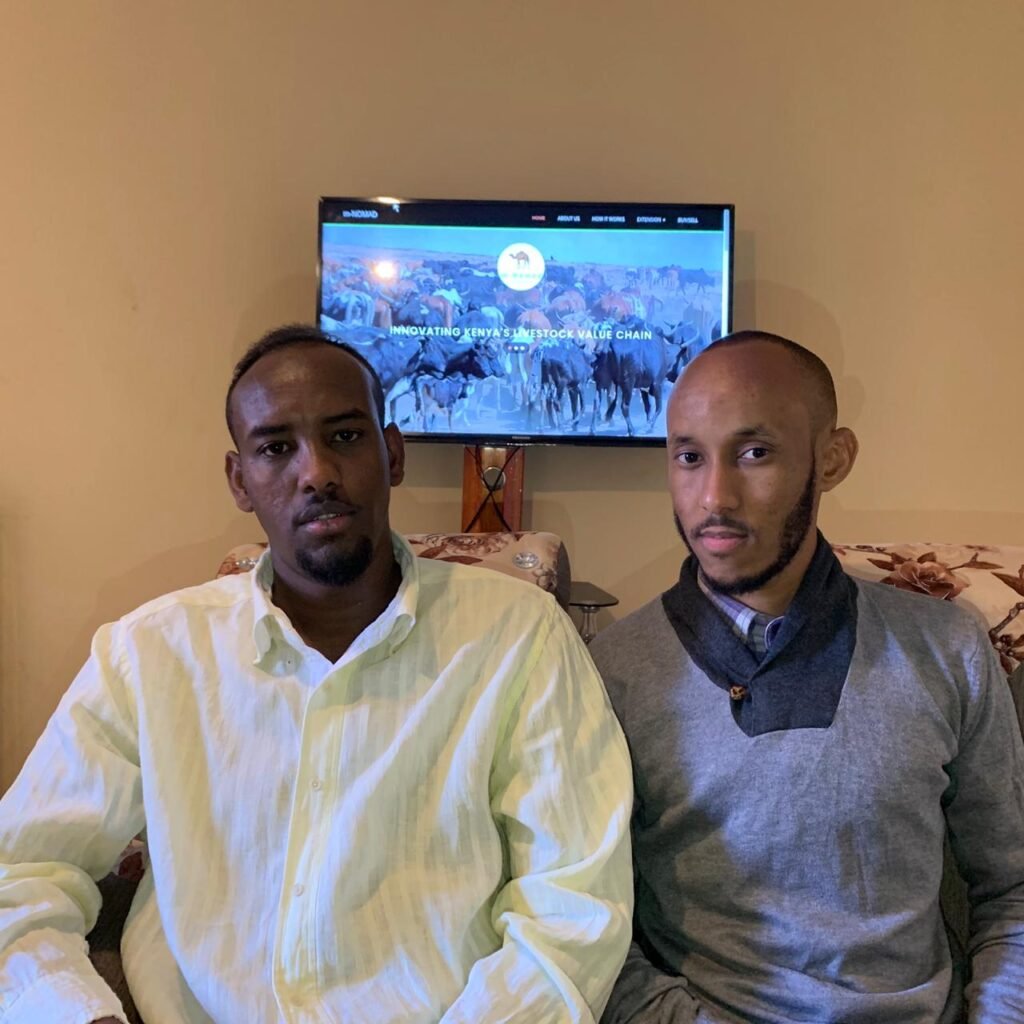By Zablon Oyugi
In the heart of Wajir, northern Kenya, where the rhythm of life is deeply tied to the movement of livestock and the changing climate, two young innovators are rewriting the story of pastoralism with technology. Ibrahim Ahmed and Abdirahman Abdullahi are two childhood friends who grew up watching their nomadic families in Wajir, northern Kenya lose cattle to droughts and disease.
Pastoralists in the region where the rhythm of life is deeply tied to livestock also grappled with unpredictable markets, poor access to veterinary care and information gaps. “In 2018, we asked ourselves—how can we change this? That’s when we began researching how to leverage technology to offer better services to livestock keepers,” says Ahmed, the 34-year-old CEO of Geljir Technologies, a social enterprise founded in 2019.
The startup developed M-nomad, an online platform connecting rural herders directly to buyers, veterinarians, and vital information services, cutting out middlemen and opening new markets for pastoralists across Kenya’s arid and semi-arid lands (ASALs). How the digital platform works M-nomad is an end-to-end digital livestock marketplace which allows users to buy and sell livestock online, with logistics and payments handled directly through the platform
. A seller can upload product details— type of animal, price, and location— while buyers input their desired preferences. Geljir’s cloud-based system then matches the parties, enabling a transparent, commissionbased transaction. Once a deal is closed, Geljir coordinates delivery and pays the seller via mobile money within 48 hours.
“We’re eliminating brokers who profit unfairly while livestock keepers earn very little,” says Abdullahi. “Now, producers are linked directly to bulk buyers and meat processors—both locally and internationally.” So far, the company has registered sellers and is working with livestock groups and organisations in northen Kenya. It has a combined reach of over 5,000 pastoralists.
Onboarding rural herders
Initially, the platform targeted urban livestock traders and pastoralists with internet access to test usability and build trust and the response has been positive. One such user is Kevin Njau, a trader based in Thika, who praises the platform’s logistics and efficiency.
“I used to spend KSh30,000 transporting a truckload of cattle to Thika (a town 40km from). Now I pay KSh25,000 with Geljir’s logistics support, and I can source directly from verified herders,” Njau says. “It’s not just cheaper—it’s reliable.”
To expand access, Geljir is developed a USSD and SMS version of M-nomad for rural users with feature phones and no internet access. This allows more herders to list animals, receive price and weather alerts, and get veterinary advice—all via text. “We want to reach the grassroots. Digital inclusion is at the heart of our solution,” says Ahmed.
Beyond market access
Recognising that poor animal health is a leading cause of loss in ASALs, Geljir has rolled out a franchise model within M-nomad to help deliver quality veterinary services and animal inputs. Through the model, pastoralists can access vaccines and drugs, animal husbandry support, flexible payment options for treatments, disease outbreak alerts and climate information. “We’re not just digitising markets— we’re building an ecosystem,” says Abdullahi, 33, a co-founder and director of innovation at Geljir. “By integrating animal health, we’re helping herders move toward more sustainable livestock systems.”
Personal connection
The founders’ deep personal connection to the livestock world gives Geljir a unique edge. Before launching their business, both men worked in Kenya’s media industry— Ahmed at CNN and later Dalsoor, the first Somali English media platform, and Abdullahi at Citizen TV and Ebru TV.
Their media experience gave them digital marketing skills and a keen understanding of storytelling—skills they now use to communicate with herders and buyers alike. “Telling stories of change through media inspired us to create change ourselves,” says Ahmed. “That’s how Geljir’s M-nomad was born.” Initially self-funded through savings, Geljir partnered with a reputable tech firm to build M-nomad’s backend systems.
In return, the firm took equity in the startup. The company now employs six staff and plans to grow to 50 employees—most of them women—in the next two years.
Needs for innovation in livestock sector
Kenya’s ASAL regions host around 60 percent of the national herd and employ nearly 90 percent of the population. According to the Kenya National Bureau of Statistics, the value of marketed livestock and products reached KSh146.8 billion in 2018 and continues to grow.
Yet, pastoralists seem a forgotten lot in the value chain and grapple with unpredictable markets, poor access to veterinary care and information gaps. Platforms like M-nomad could flip that narrative by making pastoralism more profitable and efficient. “We aim to modernise how livestock trade is done,” says Ahmed. “Think of it as the Jumia or Uber of livestock in Kenya.”
Offline auction markets
While the digital platform is growing, Geljir is also planning to launch an offline livestock auction market to include herders and buyers who may not be digitally connected.
This will serve as a physical extension of M-nomad’s reach. At the 2023 Kenya Livestock Investor Meeting in Nairobi, Ahmed and Abdullahi pitched this idea and broader investment plans to financiers, drawing attention for their innovative approach. The company is now seeking grants and impact investments to scale their solution across more counties and countries. “In the next five years, we want to completely transform livestock trading in Kenya’s ASALs,” says Abdullahi.
“Whether it’s boosting herder profits, improving access to vaccines, or equipping them with real-time data, we want to lead that change.”
Promising future
With millions of shillings’ worth of sales deals in the pipeline Geljir Technologies is proving that social enterprises can be profitable while creating lasting impact. For Ahmed and Abdullahi, their dream is not just digital—it’s deeply personal. “We want to change the livestock system of our fathers’ generation into one that’s commercially viable, techenabled, and resilient,” says Ahmed. “That’s the legacy we want to leave.

